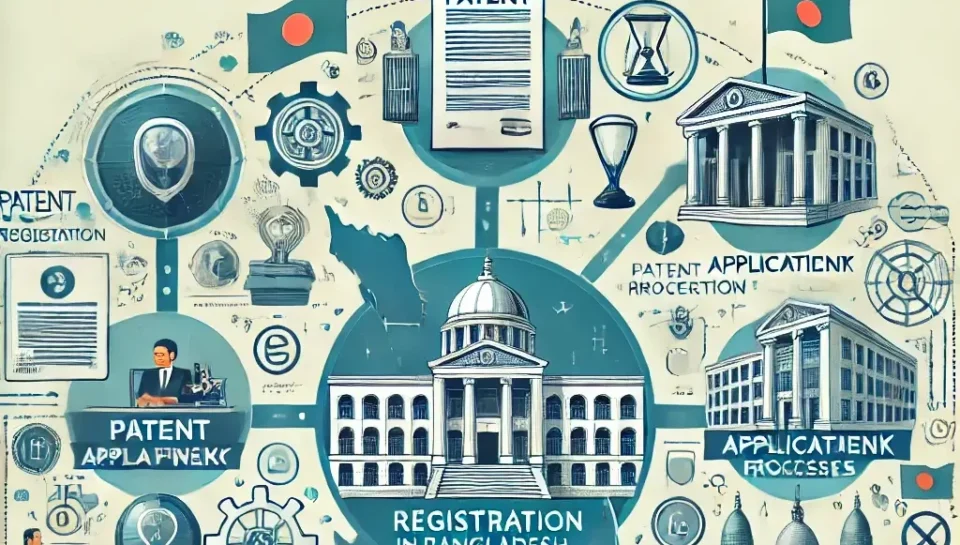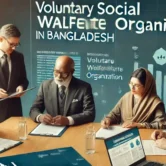Patent Registration in Bangladesh – Comprehensive Guide

This guide provides a detailed overview of patents in Bangladesh, including the relevant laws and authorities and all necessary information for patent registration procedures in Bangladesh.
In Bangladesh, a patent refers to a legal right that is granted to an inventor or their assignee for a particular invention. The Bangladesh Patent system grants inventors, together with their designated representatives, exclusive rights to their particular invention. As per Section 2(11) of the Bangladesh Patent Act, 2023, “Patent” means the exclusive right as has been granted for an invention under section 25 of this Act; and “Invention” means any invention of a new product or process which involved an inventive step and is capable of industrial application, which is not included in the excluded list of this Act (Section 2(6) of this Act).
Patent registration protects your inventions, granting exclusive rights and fostering innovation. Meanwhile, for brand identity protection, trademark registration is essential, and for safeguarding creative works, copyright registration ensures legal ownership and control
Relevant Laws governing Patents in Bangladesh:
Currently, the Bangladesh Patent Act, 2023 (Act No. 53 of 2023) is the main and recent laws with regard to patents, replacing the Patents and Designs Act of 1911. This new legislation is much-needed modernization of the patent system that brings laws in line with international standards, and promotes innovation. The Patent Rules, 1933 provides essential procedural requirements for patent applications, registrations, conducting examinations, and issuing patent registration, etc.
Statutory Bodies governing Patents in Bangladesh:
The Department of Patents, Designs, and Trademarks (DPDT), under the Ministry of Industries, is the authority responsible for receiving and granting patents in Bangladesh. Among others, DPDT has four main roles: (i) accepting and examining patent applications, (ii) granting patents after a thorough examination, (iii) patent dispute resolution and (iv) publishing the Official Gazette with patent-related information. www.dpdt.gov.bd.
Who is eligible to apply for a patent in Bangladesh
According to section 4 of the Bangladesh Patent Act, 2023, the following persons are entitled to submit a patent application:
(a/ka) Inventor: The true and first inventor of the invention.
(b/kha) Assignee: Someone who has been given rights by the inventor.
(c/ga) Legal Representative: Representative of a deceased person who was eligible to apply.
(d/gha) Joint Inventors: If the invention is a joint effort, rights shall be shared by all inventors.
(e/nga) First Applicant: If two or more people invent the same thing independently, the person who applies for the patent first gets the patent.
(f/cha) Transferable Rights: Patent rights are transferable or inheritable.
(g/chha) Employer’s Rights: When an employee invents something in the course of their employment (for purposes of inventing), that invention usually belongs to the employer.
(h/ja) Use of Employer Resources: Usually, inventions using employer resources typically give patent rights to the employer unless stated otherwise in the agreement.
Procedure for Patent Application in Bangladesh
The patent application process in Bangladesh has been significantly updated under the Bangladesh Patent Act of 2023.
Stage 1: Filing of the patent application following the prescribes requirements
The applicant needs to submit a prescribed form to the Registrar of the Department of Patents, Designs, and Trademarks (DPDT) along with the required fee. The application may be filed by anyone, whether Bangladeshi or foreign; although foreign applicants must do so through a local law firm. The application must include:
Full details of the applicant and inventor.
- A clear title for the invention.
- A detailed description of the invention, and how it works.
- A summary of the invention.
- Drawings or diagrams, as necessary.
- Priority claim information, if applicable.
- A summary of the innovation (maximum 300 words).
- Complete specifications or provisional specifications if applicable.
What documentation is required for filing a patent application in Bangladesh?
Along with the application form, several documents need to be submitted:
- Form-1 or 1A / 2 or 2A
- A forwarding letter addressed to the Registrar of DPDT.
- Bank draft or chalan form: Tk. 2,000 for an ordinary application (up to 25 pages and 10 claims). Additional charge of Tk. 100 per page or claim over 25 pages or 10 claims.
- Priority application fee: Tk. 10,000 for up to 25 pages and 10 claims. Extra fees amounting to Tk. 100 are required for every new page beyond 25 pages or 10 claims.
- Drawing sheets (if any): drawing sheets must be submitted in one set on tracing paper, accompanied by a photocopy duplicate.
- Complete specification: Two sets in Form 3A.
- Your application needs a Power of Attorney if someone else files on your behalf.
- If you’re not the inventor, you must provide documents explaining how you got the rights (e.g., transfer or assignment papers).
- Priority claims require submission of certified documentation.
Types of Specifications: A brief summary of the invention should be submitted through an initial provisional specification. You must submit a complete specification that incorporates all the data in 12 months after the provisional filing.
Key Details for the Complete Specification
- Detailed description with the title, nature, and how the invention is to be performed so others can understand and use the invention.
- Whether it’s a product/ device/ product or process or both.
- The specific features you want patent protection for.
- Disclosure of Prior Knowledge about the invention.
- Ownership Declaration must be submitted.
- Field, prior art, objectives, and detailed description.
- Novelty, inventive steps, industrial applicability.
- Abstract
- A brief summary and any required diagrams or drawings.
Stage 2: Examination of the application
Assessment by Registrar:
After submission, if your application isn’t complete, the authority will ask you to fix it within a specified time. Your application will be unsuccessful if you do not rectify.
Stage 3: Publication and Potential Opposition
Section 19 of the 2023 Act provides that subject to Section 17, anyone can oppose a patent application from publication until grant through the Director General by presenting evidence regarding novelty issues and inventive steps and eligibility claims. The opposition can then be rejected, amended or declined:
If there are no objections after a period of 18 months from the date of filing, then the patent shall be published for inspection.
- The application will automatically be examined and, the first examination report is usually made within 18 months of the filing date – either on the web site or in the normal way of notification
- Patent shall not be granted until 06 (six) months from the said publication
- If there is no opposition in this timeframe, the Registrar will proceed to grant the patent.
Stage 4: Letters of Patent are Issued
If all steps have been accomplished without an opposition, a Letters Patent will issue typically 24 to 28 months from the date of filing, upon payment of a sealing fee.
Patent Term, Fees and Renewal
As per Section 28 of the 2023 Act:
- Patent Duration: 20 years from the date of filing or priority date.
- Annual Renewal: Patent can be renewed by paying annual fees. Late payment is allowed with a 3-month extension. A patent is cancelled for failure to pay within the extended period, and the patentee loses all rights over it.
- Patent Restoration: If the Director General finds reasonable cause for non-payment, the patent maybe restored within 2 years of expiry, but you need to pay for the renewal and restoration.
What types of inventions or subject matters are considered non-patentable under the patent laws of Bangladesh?
The non-patentable subject matter in Bangladesh is provided under Sections 6 and 7 of the Patents and Designs Act, 1911, as such:
- Scientific Theories and Abstract Ideas: Discoveries, together with theories, mathematical methods, business processes, and computer programs are not patentable.
- Medical and Diagnostic Methods: Surgical, therapeutic, and diagnostic procedures for humans or animals are excluded.
- Natural Substances: Use of natural materials or their derivatives in unaltered forms.
- Plants and Animals: Patents don’t cover whole plants, animals, or biological processes.
- Public Morality and Safety: Inventions harmful to health, environment, or public order are excluded.
- Frivolous Inventions: Objects or processes with no practical utility or violating natural laws lack eligibility.
- Traditional Knowledge: Innovations replicating or combining existing traditional knowledge are not allowed.
- Integrated Circuits and Information: Descriptions of circuits or mere data presentation can’t be patented.
- Known Substances: Rediscovering known substances with new uses without creating something novel.
- Pharmaceuticals and Agrochemicals: Excluded during the TRIPS exemption period.
- Atomic Energy: Inventions that relate to nuclear energy and radioactive materials are prohibited.
Legal grounds and procedures for patent cancellation in Bangladesh?
As per Section 32 of the Act:
- Applicability: Any individual who has an interest in a patent may petition the court for its invalidation.
- Grounds for Patent Cancellation: failure to meet conditions under Section 8 and the patent owner is not the inventor.
- Cancellation works means the entire patent or specific claims are be invalidated from the date it is granted.
- Alternative Remedy: Instead of cancellation, the applicant can apply to the competent court for patent ownership transfer.
- Administrative Process: After reaching a final decision the court must send its decision to the Director General for recording and publication.
What are the legal grounds and process for patent revocation in Bangladesh?
Under section 33, a patent may be revoked by the District Court based on the following grounds, if the:
- Invention is already claimed known, used, or published in another valid patent in Bangladesh
- Person applying for the patent was not entitled
- Invention violates someone else’s rights
- Invention is not a true invention, does not involve an inventive step, is non-usable or does not meet patentability criteria
- Insufficient patent’s description to replicate it
- Claims are unclear or improperly based on the specification
- Patent obtained through false information
- Subject matter of the invention is not patentable
- Use of any source of biological material used is not disclosed
- Invention based on traditional knowledge
A notice of revocation application must be given to the patent owner or those with an interest in the patent.
What are the Rights of the Patent Owner and its Enforcement Mechanism in Bangladesh
Section 25 provides therights of a patent owner:
The owner has the exclusive right to stop others from making, using, selling, offering for sale, or importing the product or process to be patented, into Bangladesh without their permission.
Section 44 contains the provisions for enforcement of the patent rights as such:
- If someone violates a patent right, the owner can sue for infringement.
- If a licensee fails to follow the written agreement, they can sue the patent owner to enforce the agreement.
- If a licensee breaches the license terms, the patent owner can sue to enforce the agreement.
Border measures: Request customs authorities to seize infringing goods at the border.
The Act also incorporates provisions for alternative dispute resolution (ADR) mechanisms, including mediation and arbitration, to facilitate the efficient resolution of patent disputes.
What remedies are available in Court (Section 49):
- The court may grant permanent injunctions (order to stop certain actions) and compensation for breach of conditions or patent infringement to protect the rights of the licensee or patent owner. Here, the compensation shall be determined considering factors like registration dates, fair pricing, local impact, and harm caused. (Section 49)
- The court may handle both the infringement and revocation claims of the plaintiff and the defendant together.
Compensation (Section 54):
(1) The court may grant permanent injunctions and compensation for breach of conditions or patent infringement.
(2) False Entries in Patent Registers (Section 54(2)): If someone makes a false entry or misrepresents an entry in any patent register, they may face a fine up to 50,000 taka.
(3) Misrepresentation of Patent Status (Section 54(3)): If a person falsely claims that goods or processes have been patented or that a patent application has been filed in Bangladesh, the violator may be ordered to pay compensation up to 50,000 taka.
(4) Misuse of Official Terms (Section 54(4)): If someone uses terms like “Department of Patents, Industrial Designs, and Trademarks” or similar terms to imply that their business has authority to register patents, it is a violation. The violator may be fined up to 50,000 taka.
FAQ about patents in Bangladesh:
1. What is a patent?
A patent is a legal instrument that provides the inventor or their assign to hold exclusive rights against anyone from making, using selling or distributing the invention without permission. It safeguards intellectual property and stimulates innovation.
2. Who grants patents in Bangladesh?
The Department of Patents, Designs, and Trademarks (DPDT), under the Ministry of Industries, is the authority responsible for granting patents, handling applications, and maintaining the patent register.
3. What are the not patentable inventions in Bangladesh?
Patent law in Bangladesh does not protect the following:
- Findings of Natural Substances
- Scientific theories, mathematical formulas or natural laws.
- Agricultural, horticultural, or medical treatment methods
- Inventions against public order or good morals and laws of nature.
- Theoretical ideas that have no real-world applicability.
4. What are the Classes of Patent Registration System in Bangladesh?
The patents in Bangladesh are classified according to the International Patent Classification (IPC) system under which inventions are categorized as per their technical subject matter (such as chemistry, mechanical engineering, electronics, etc.).
5. What happens if a patent is not renewed?
The patent holder must pay a fee to maintain the patent. If you do not pay the renewal fee, the patent expires, and the invention becomes part of public domain, which means it can be used by anyone without charge. As a result, the patent holder loses exclusive legal right over the product.
6. Can a patent be transferred or licensed?
Yes, a patent can be:
- Transferred: Any applicant can apply to the competent court for patent ownership transfer fully or partially to another person or entity.
- Licensed: Granted to another party for use under agreed terms and conditions. Both assignments and licenses must be registered with the DPDT.
7. Can I file an international patent from Bangladesh?
Bangladesh is a party to the Paris Convention but not a party to the Patent Cooperation Treaty (PCT). This means that you can claim priority under the Paris Convention with conventional priority within 12 months of filing in Bangladesh to seek protection in other member countries.
If you want protection in some of the target countries or regions, you need to make regional applications in each of the countries.
Information regarding foreign patent application documents
Section 15 of the Patent Act, 2023, requires applicants who have filed a patent application in a foreign country to submit certain documents to the Director General within 90 days including:
- A statement with details of the application.
- A copy of the examination results or search information from the foreign application.
- A copy of the granted patent, if any.
- A copy of the rejected foreign application.
- Any notice of revocation or abandonment of the patent.
- Any other relevant orders, such as for amendments.
The applicant can request up to 60 additional days to provide these documents, if necessary. Additionally, the applicant is required to file updates every 6 months until the patent has been granted or rejected. If the applicant does not meet these requirements for justifiable reasons, the application will not be considered as rejected.
8. What international agreements does Bangladesh adhere to for patents?
Bangladesh is a member of:
- World Intellectual Property Organization (WIPO).
- Paris Convention for the Protection of Industrial Property.
- Trade-Related Aspects of Intellectual Property Rights (TRIPS) agreement under the WTO.
These memberships are a guarantee that the country complies with international standards and is in contact with the other countries on matters of intellectual property.
9. Bangladesh Patent Compliance with TRIPS:
The Patent Act, 2023 will comply Bangladesh’s patent laws with the international standards of WTO’s TRIPS agreement. With this comprehensive process, Bangladesh has reiterated its commitment to establishing a pro-innovation environment. The county also aims to provide robust intellectual property protection for inventors and businesses alike.
10. What remedies are available for patent infringement?
A patent holder has certain exclusive rights to their invention, which means that unauthorized use, manufacture or sale of that patent by a third party can be considered patent infringement. Remedies include:
- Injunctions: Court orders requiring the defendant to cease the infringement.
- Damages: Money awarded to cover the financial loss.
- Enforcement: The patent holder can file a civil suit.
11. What is the function of the Official Gazette?
To keep the public notified and to ensure transparency in the patent process, the DPDT publishes patent applications, oppositions and patent grants in the Official Gazette.
12. Can I oppose a patent?
Yes, patents may be opposed on the grounds of lack of novelty, inventive step and/or eligibility. The opposition will need to be filed within a designated period (as per the time limit provided in the Official Gazette) and proof of service to the Director General will be necessary.
13. What if my patent application is rejected?
If your patent application is rejected, can you change the outcome:
- You can adjust or modify your claims and you adapt them or you respond to the objections put forward by the DPDT and resubmit it.
- Appeal to the relevant authority or court within 3 months
14. Are there any alternatives to patent protection?
If patenting is not appropriate, there are other protection forms in the field of intellectual property:
- Trade Secrets: Keeping proprietary processes confidential.
- Trademarks: Protecting brand identity.
- Industrial Design Registration: Protecting aesthetic aspects
- Geographical Indication: protects regional product characteristics
- Copyrights: Protecting creative and artistic works.
15. What are the challenges in the patent system in Bangladesh?
- Despite the implementation of the Patents Act 2023, there are still obstacles like limited enforcement capabilities and incomplete alignment with global IP standards.
- Limited international patent filing options due to non-membership in the PCT.
- Slow processing times at the DPDT.
- Technical infrastructure limitations.
- Lack of awareness about intellectual property rights.
- Insufficient specialized IP courts.
- High patent filing costs and limited resources for patent protection.
- Challenges in cross-border patent enforcement
16. International Recognition for Bangladesh Patent System
While patents granted in Bangladesh are valid only within Bangladesh, there are international mechanisms to seek broader protection. For example:
- Bangladesh is a member of the World Intellectual Property Organization (WIPO) and a signatory to the Paris Convention for the Protection of Industrial Property, as well as the Agreement on Trade-Related Aspects of Intellectual Property Rights (TRIPS) under the World Trade Organization (WTO). These memberships ensure that Bangladesh complies with international standards for intellectual property rights (IPR) protection.
- International protection requires filing separate applications in other countries or through mechanisms like the Patent Cooperation Treaty (PCT), which Bangladesh has not yet joined.
- Under the Paris Convention, inventors from Bangladesh can claim priority for their patents in other member countries within 12 months of filing the original application.
LegalBD is a recognized IP law firm in Bangladesh. Contact for more details and assistance.







